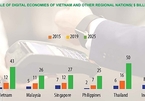 |
|
Pham Xuan Hoe from the Banking Strategy Institute speaks at a forum in Hanoi on January 7. — Photo infonet.vn
|
Attending the forum held by the Vietnam Institute for Economic and Policy Research (VEPR), Hoe said: “if Vietnam can catch up with the revolution in time, the digital economy can help the country close the gap with other nations around the world.”
However, he was concerned about policies to help boost digital transformation, saying: “Vietnam still applies outdated policies in a new economic context.”
Economist Nguyen Tri Hieu told the forum: “Since 2016, the country has spoken a lot about the advantages from the fourth industrial revolution but, after four years, I don’t see where it is in such a revolution.”
Responding to both comments, Ho Tu Bao from the Japan Advanced Institute of Science and Technology, said: “Vietnam is in the initial stages of the revolution,” adding that each revolution takes between 50 to hundreds of years.
Bao said the fourth industrial revolution is one of digital transformation, which helps close the gaps in social relationships, ease the burden on labour and remove the role of intermediaries to develop the economy.
Bao is working with the Ministry of Health on a plan to connect the medical records of more than 50 million people with their health insurance details and another plan with the Ministry of Transport to connect transport records of 1.2 million vehicles.
“It is the last chance for Vietnam to take advantage of the era,” Bao said.
The two most important areas for digital transformation were tourism and agriculture, as the main drivers of economic growth in Vietnam.
“Some ministries go fast and some go slower in digital transformation, however, the awareness of many leaders has been improved.
“Digital transformation is a long term project, and should take at least 10 years,” Bao said.
Hosting the forum, VEPR director Nguyen Duc Thanh agreed that the economy was changing.
Recognising the Government’s efforts, VERP’s director said Vietnam was spending on building an e-Government but the process was slow. Half of the country’s ministries were not yet digital.
Thanh told the forum: “The transformation will take time as the people (who make decisions) are still the same. There is no other way than to wait for them to change their minds.”
Professor Cao Doan told the forum that: “Vietnam should define a clear plan for the revolution, or it will lose out.”
According to the Central Institute for Economic Management (CIEM), the implementation of the fourth industrial revolution can help boost economic growth from $28.5 billion to $62.1 billion, equivalent to 7-16 per cent of GDP over the next ten years.
Lucy Cameron, lead author of the report “Vietnam’s Future Digital Economy Towards 2030 and 2045”, in 2019 forecast that in the best scenario, Vietnam will carry out a digital transformation across industries and export ICT products and services, GDP could see an increase of VND3.750 trillion in the next 20 years, an annual increase of 1.3 per cent.
According to the SBV’s Payment Department, ending 2019, the country had 78 organisations providing payment services online, 45 organisations providing payment services via mobile banking and 83.3 million personal bank accounts. VNS

Increasing business readiness for 4.0 era
The Fourth Industrial Revolution is now bringing immense prospects to Vietnamese enterprises to conduct digital transformation and smart production.

Improving frameworks in order to reach the Industry 4.0 peak
New disruptive technologies associated with Industry 4.0 are changing how companies do business, and so finding a mechanism to adapt these new technologies to modern development needs is imperative.
 Vietnam needs a “revolution in its policy-making mind-set” before it can take advantage of the fourth industrial revolution, said Pham Xuan Hoe from the Banking Strategy Institute, at a forum in Hanoi on January 7.
Vietnam needs a “revolution in its policy-making mind-set” before it can take advantage of the fourth industrial revolution, said Pham Xuan Hoe from the Banking Strategy Institute, at a forum in Hanoi on January 7.